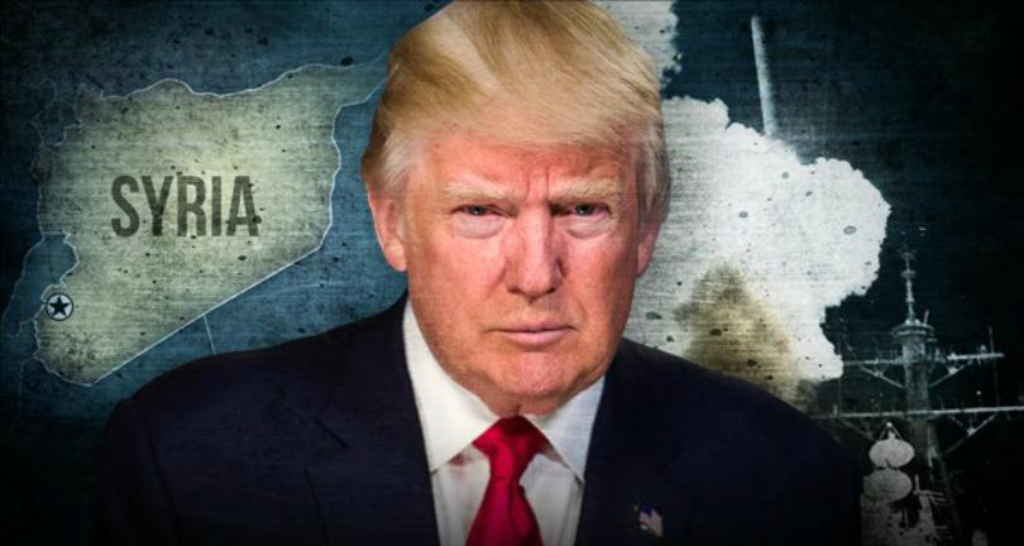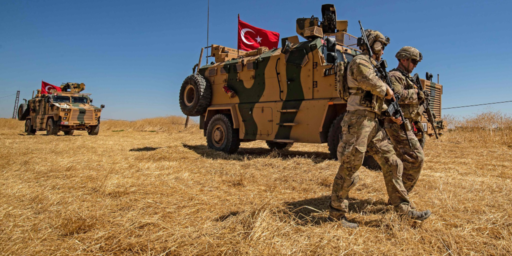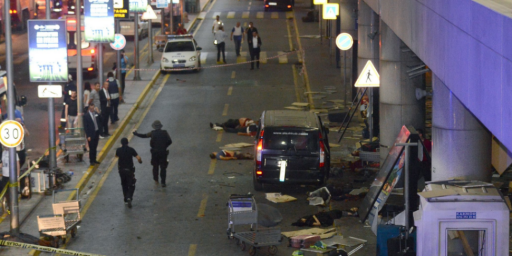Trump Pulls U.S. Forces From Northern Syria, Leaving Kurds Vulnerable
The United States is withdrawing its small force from Northern Syria, clearing the way for a Turkish invasion that will likely aim to wipeout the Kurdish forces in the region.

In a somewhat extraordinary step, the remaining American forces in Syria are set to step aside in favor of what is expected to be a major Turkish military operation that will mostly target the Kurdish allies that have fought alongside American advisers and Syrian rebels throughout the long Syrian civil war:
WASHINGTON — In a major shift in United States military policy in Syria, the White House said on Sunday that President Trump had given his endorsement for a Turkish military operation that would sweep away American-backed Kurdish forces near the border in Syria.
Turkey considers the Kurdish forces to be a terrorist insurgency, and has long sought to end American support for the group. But the Kurdish fighters, which are part of the Syrian Democratic Forces, or S.D.F., have been the United States’ most reliable partner in fighting the Islamic State in a strategic corner of northern Syria.
Now, Mr. Trump’s decision goes against the recommendations of top officials in the Pentagon and the State Department who have sought to keep a small troop presence in northeast Syria to continue operations against the Islamic State, or ISIS, and to act as a critical counterweight to Iran and Russia.
Administration officials said that Mr. Trump spoke directly with President Recep Tayyip Erdogan of Turkey on the issue on Sunday. And the officials indicated that the 100 to 150 United States military personnel deployed to that area would be pulled back in advance of any Turkish operation but that they would not be completely withdrawn from Syria.
On Monday, witnesses in Syria saw United States forces withdrawing from two positions in northeastern Syria: observation posts in Tel Abyad and Ein Eissa.
“Turkey will soon be moving forward with its long-planned operation into Northern Syria,” the White House said in a statement released just before 11 p.m. in Washington. “The United States Armed Forces will not support or be involved in the operation, and United States forces, having defeated the ISIS territorial ‘Caliphate,’ will no longer be in the immediate area.”
It was unclear how extensive the Turkish operation would be, or whether Turkish forces would clash with the American-backed Kurds, a development that could jeopardize many of the counterterrorism gains achieved by the American military in the fight against ISIS.
Last December, Mr. Trump called for a complete United States withdrawal from Syria, but ultimately reversed himself after a backlash from Pentagon, diplomatic and intelligence officials, as well as important allies in Europe and the Middle East.
Soner Cagaptay, the director of the Turkish Research Program at the Washington Institute for Near East Policy, and author of “Erdogan’s Empire: Turkey and the Politics of the Middle East,” said in a telephone interview that a Turkish incursion uncontested by the United States would allow Turkey to cut another swath into Kurdish-controlled territory in Syria. That would give Mr. Erdogan a ready place to send hundreds of thousands of Syrian refugees and prove yet again his influence with Mr. Trump on Syria policy.
“It’s a quite a significant development,” Mr. Cagaptay said.
Many Syria experts criticized the White House decision and cautioned that American abandonment of its Kurdish allies could widen the eight-year Syrian conflict and prompt the Kurds to ally with the Syrian government of President Bashar al-Assad to combat the much larger and more technologically advanced Turkish army.“Allowing Turkey to move into northern Syria is one of the most destabilizing moves we can do in the Middle East,” Representative Ruben Gallego, an Arizona Democrat and former Marine who served in the Iraq war, said on Twitter on Sunday night. “The Kurds will never trust America again. They will look for new alliances or independence to protect themselves.”
The announcement by the White House came as a shock to the S.D.F., Kurdish officials said on Monday. In a statement, the S.D.F. said that it had fulfilled its obligations in the efforts to reduce tensions with the Turks but that the United States had not.
The statement warned that a Turkish incursion could endanger the progress made to establish security in the wake of the battle against the Islamic State. It also called on Kurdish forces to “defend our homeland from the Turkish aggression.”
More from The Washington Post:
The United States began withdrawing American troops from Syria’s border with Turkey early Monday, in the clearest sign yet that the Trump administration was washing its hands of an explosive situation between the Turkish military and U.S.-allied Kurdish fighters.
The withdrawal followed a late Sunday statement by the White House that the United States would not intervene in a long-threatened Turkish offensive into northern Syria. The announcement, which signaled an abrupt end to a months-long American effort to broker peace between two important allies, came after a call between President Trump and Turkish President Recep Tayyip Erdogan.
Erdogan said in a speech Monday that the withdrawal began soon after their phone call.
A U.S. official confirmed to The Washington Post that troops had left observation posts in the border villages of Tel Abyad and Ras al-Ayn at 6:30 a.m. local time.
White House press secretary Stephanie Grisham said the Turkish leader would “soon be moving forward” with dispatching troops to battle Kurdish forces who Ankara sees as terrorists but whom have been a chief U.S. partner against the Islamic State.
“The United States armed forces will not support or be involved in the operation, and United States forces, having defeated the ISIS territorial ‘caliphate,’ will no longer be in the immediate area,” Grisham said in a statement. ISIS is another name for the Islamic State, the militant group whose rise drew the U.S. military into Syria.
The Syrian Democratic Forces, a major Kurdish group that has fought closely with the U.S. military, said the U.S. troops had already begun pulling out and criticized them for not fulfilling their obligations.
“The United States forces have not fulfilled their obligations and withdrew their forces from the border area with Turkey,” the statement said. “This Turkish military operation in north and east Syria will have a big negative impact on our war against Daesh and will destroy all stability that was reached in the last few years.” The statement used the Arabic acronym for ISIS
It added that the group reserved the right to defend itself against Turkish aggression.
Erdogan, who has portrayed a Turkish incursion as necessary to protect his country’s borders, has spoken in recent weeks of resettling millions of Syrian refugees in Turkey in a “safe zone” in northern Syria, a plan that has been criticized by refugee advocates as well as local Syrian Kurds who could be displaced by such a proposal.
On Saturday, Erdogan said the invasion could begin “as soon as today or maybe tomorrow.” The operation — which he called “fountains of peace” — would be conducted by air and land, he said.
U.S. officials depicted the impending offensive, and the U.S. troop withdrawal, as a dramatic turn after their prolonged attempt to hammer out an arrangement that would allay the Turks’ concerns about Syrian Kurdish forces close to their border, while also averting a battle they fear will be bloody for Kurdish fighters who the Pentagon see as a stalwart ally.
Brett McGurk, who served as the United States envoy to the coalition to defeat ISIS until resigning from that position at the end of the year in protest over the President’s Syria policy, had a particularly harsh reaction to this announcement on Twitter:
Reports this morning indicate that the small American force — roughly 100 to 150 troops, most of whom were serving as military advisors to the Kurdish-dominated Syrian Defense Force — in the region that the Turks are expected to move into has already started withdrawing. This is a strong indication that the Turkish forces are not far behind, and perhaps may enter the area as soon as some point today or tomorrow. Ostensibly and officially, the purpose of the Turkish operation is to create a “safe zone” that the Turks would use to return a significant portion of the Syrian refugees currently residing inside its borders. Unofficially, it is also believed that the operation is aimed at attacking the Kurdish forces in Syria, which Turkey sees as a threat to its interests because of the impact these forces have had on the Kurdish minority inside Turkey itself. Assuming that the Turks do move against the Kurds, there seems to be little doubt that the far superior Turkish military would be able to easily defeat the Kurds.
Obviously, this small contingent of American forces was never going to make much of a difference in the course of the war against either the remnants of ISIS in Northern Syria or the regime of Bashar Assad. In theory, at least, they also couldn’t possibly be seen as a barrier to the establishment of a Syrian safe zone inside Syrian. The one thing they were doing, though, is serving as a bulwark against any kind of Turkish move against Kurds who have been American allies since the beginning of the fight against ISIS. Whether in Iraq or in Syria, the bulk of the ground fighting that has been undertaken against ISIS fighters has been led by the secular forces of the Kurds, a force made up of men and women hoping that their efforts would somehow end in the reward of their long-desired homeland. Instead, it looks as though they’re about to be stabbed in the back, and NBC’s Richard Engel notes that they recognize exactly what’s happening:
What happens from here depends on what the Turks do and how the Kurds react. Knowing the Kurds, they aren’t going to put their tails between their legs and retreat, and it could be that the Turks will be biting off more than they can chew. We’ll see. In the meantime, one has to wonder why any indigenous force would ever agree to help the United States again after this. Leaving aside the question of whether or not we should be in Syria at all at this point, and I tend to lean toward the side that says we should not, this is not the way to carry out a withdrawal and it sends precisely the wrong message not only to the Kurds who have stood by our side for years now but also potential future allies who are no doubt looking at the knife with American fingerprints sticking out of the back of the Kurds and taking notes.




Sounds like Erdogan promised even better dirt on Biden.
Hey, what Erdogan wants, Erdogan gets. If you’re a homicidal dictator, Trump loves you.
I remember when “The President is abandoning our allies” was a Republican talking point. Especially during the Obama Administration.
It has seemed to me that the US abandoning the Kurds was inevitable; the question was when. Despite internal discord, the Kurds’ goal has always been Kurdistan, carved out of Iran, Iraq, Syria, and Turkey. The US was never going to do that carving, nor provide long-term cover while the Kurds attempted the carving.
What Would Putin Do?
@Teve:
I’m certain if Putin were in Dennison’s shoes, he’d ask Putin what he wants done.
H/t Jamelle bouie
@DrDaveT:
Maybe the dirt was kompromat on Trump, e.g., foreknowledge of what was going to happen to Khashoggi.
I dislike Trump as much as anyone, but I think the US position and actions in this region haven’t made a sense for a long time and pulling out might not be all that bad. In 2003 we went to war against Iraq. Did that make sense? We did not have any grounds for such a radical step that led to the death of certainly more than 100,000 people, major destruction, and the creation of maybe a million refugees. Somebody came up with a figleaf of an excuse at that time saying that we were helping the Kurds attain nationhood. Kurdish nationhood is a problem because the Kurds are spread across three nations, Iraq, Iran, and Turkey, and those three nations do not wish to allow the dismantling of their territory to establish a separate state. Additionally, the Kurds are not united on what entity should lead their state. I do not know enough about the region to comment on the legitimacy of the Kurdish desires. I do know that the US response to that region has been shoot first, bomb first, and think about it later. I welcome taking a step back. Can we think through things before pounding our chest and sending in troops?
Between this and pulling out of the Iran deal while they were in compliance, the world is learning that the US can not be relied on. Any word we give may be broken tomorrow. Any ally may find themselves abandoned.
And PoTUS has decided to make a statement on this via Twitter… and man, it’s… well, something:
General thought is he’s pissed a Brian Kilmeade who called him out on this decision on Fox and Friends this morning.
This is worse than just leaving — this is explicitly inviting Turkey in.
We could have, theoretically, told the Turks not to enter, and they may or may not have listened to us, but we have military aid and other levers to provide some leverage.
@mattbernius: Oh, dear God. I was hoping this was a joke on your part, but I checked Trump’s Twitter account and clearly it’s not. God help us.
The Kurds hold a whole lot of ISIS fighters at the moment. It’s not hard to figure out they may not be able to for long, at which time a mass release of said fighters will occur.
What could possibly go wrong?
@Michael Cain:
We should probably re-examine how we handle ethnic minorities in war torn regions with crudely drawn national boundaries. I don’t see any reason that the lines drawn by retreating colonial powers a hundred years ago need to be respected more than the people living in those areas, especially when there is no functional government (Iraq post invasion, Syria now).
Why not support Kurdistan, carved from Syria? We should have done it with Iraq too, when we had the chance.
I see three options:
– perpetually keep troops in a war torn area to prevent genocide
– walk away and let the genocide happen
– try to create a new, stable status quo.
I don’t see that third option as worst. It could go very badly, but probably no worse than genocide.
@mattbernius:
As Dan Larison put it, “Anyone who refers to his own “great and unmatched wisdom” obviously doesn’t have any wisdom to speak of, and it shows in this unhinged threat.”
@Slugger:
Yes, but(*) once you’ve gone in, made alliances, made promises, given aid, taken part, set up conditions, etc. you can’t just leave.
At some point leaving may be the least worst option, but even then you consult with your allies, your military and diplomatic staff, and you draw up a plan to leave. So when the president (a real one) announces this move, the State Department and the Pentagon are prepared and have plans already, and so do your allies who can’t just take their ball and go home the way you can.
(*) I realize the “yes, but” form of argument can be quite infuriating.
@mattbernius:
My first reaction was “that has to be The Onion.” Lord in heaven help us, it’s not.
I think that if Madison and Hamilton were here, they would agree that unironically referring to your own “great and unmatched wisdom” is an impeachable offense.
Turkey has already started bombing Kurdish positions, in areas U. S. advisers were (or maybe still are?) operating.
They can’t do any deconfliction because we threw them out of the Joint Air Operations Center.
What could possibly go wrong?
Well, well. The GOP Congressional followership (they’re not leadership), has found something they really don’t like about Dennison.
I doubt they’re growing a spine, at long last, but perhaps they are serious about not obviously damaging US national interests on El Cheeto’s whims. Non-glaringly obvious damage, such as running foreign policy for political gain, seems fine by them still.
@Kathy: Baby steps. Well… quarter baby steps. Or maybe the kind of little teeny ballerina steps that people use when walking on a icy sidewalk in street shoes. (Does anyone wear street shoes anymore?)
@Kathy: You are right. I did not realize that Trump made this decision without input from our staff actually working on this problem and without warning the Kurds. My mistake.
I still think our whole posture in the Levant has never had a sufficient review.
I’ve seen this dance step. Use the Kurds and then abandon them. Circa 1991. H W Bush w Cheney as SECDEF.
ROUND 2. Donald the Trump never ceases to embarrass and fail us.